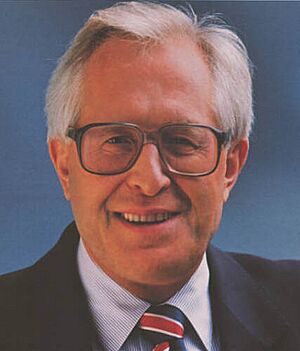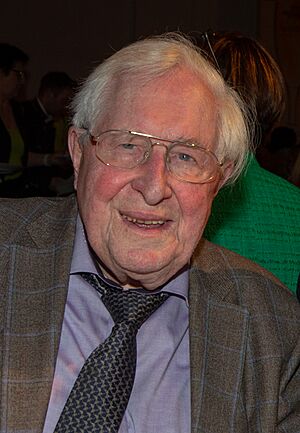Bernhard Vogel facts for kids
Quick facts for kids
Bernhard Vogel
|
|||||||||||||||||||||||||||||
|---|---|---|---|---|---|---|---|---|---|---|---|---|---|---|---|---|---|---|---|---|---|---|---|---|---|---|---|---|---|

Vogel in 1994
|
|||||||||||||||||||||||||||||
| Minister-President of Thuringia | |||||||||||||||||||||||||||||
| In office 5 February 1992 – 5 June 2003 |
|||||||||||||||||||||||||||||
| Deputy | Ulrich Fickel Gerd Schuchardt Andreas Trautvetter |
||||||||||||||||||||||||||||
| Preceded by | Josef Duchač | ||||||||||||||||||||||||||||
| Succeeded by | Dieter Althaus | ||||||||||||||||||||||||||||
| President of the Bundesrat | |||||||||||||||||||||||||||||
| In office 1 November 1987 – 31 October 1988 |
|||||||||||||||||||||||||||||
| First Vice President | Walter Wallmann | ||||||||||||||||||||||||||||
| Preceded by | Walter Wallmann | ||||||||||||||||||||||||||||
| Succeeded by | Björn Engholm | ||||||||||||||||||||||||||||
| In office 3 December 1976 – 31 October 1977 |
|||||||||||||||||||||||||||||
| First Vice President | Albert Osswald | ||||||||||||||||||||||||||||
| Preceded by | Albert Osswald | ||||||||||||||||||||||||||||
| Succeeded by | Gerhard Stoltenberg | ||||||||||||||||||||||||||||
| Minister-President of Rhineland-Palatinate | |||||||||||||||||||||||||||||
| In office 2 December 1976 – 8 December 1988 |
|||||||||||||||||||||||||||||
| Deputy | Otto Meyer Carl-Ludwig Wagner |
||||||||||||||||||||||||||||
| Preceded by | Helmut Kohl | ||||||||||||||||||||||||||||
| Succeeded by | Carl-Ludwig Wagner | ||||||||||||||||||||||||||||
| Minister for Education and Culture of Rhineland-Palatinate | |||||||||||||||||||||||||||||
| In office 18 May 1967 – 2 December 1976 |
|||||||||||||||||||||||||||||
| Minister-President | Peter Altmeier Helmut Kohl |
||||||||||||||||||||||||||||
| Preceded by | Eduard Orth | ||||||||||||||||||||||||||||
| Succeeded by | Hanna-Renate Laurien | ||||||||||||||||||||||||||||
|
|||||||||||||||||||||||||||||
| Personal details | |||||||||||||||||||||||||||||
| Born | 19 December 1932 Göttingen, Province of Hanover, Prussia, Germany |
||||||||||||||||||||||||||||
| Died | 2 March 2025 (aged 92) Speyer, Rhineland-Palatinate, Germany |
||||||||||||||||||||||||||||
| Political party | CDU (from 1960) | ||||||||||||||||||||||||||||
| Relatives | Hans-Jochen Vogel (brother) | ||||||||||||||||||||||||||||
| Alma mater | Heidelberg University Munich University |
||||||||||||||||||||||||||||
| Signature |  |
||||||||||||||||||||||||||||
Bernhard Vogel was an important German politician. He was born on December 19, 1932, and passed away on March 2, 2025. He was a member of the Christian Democratic Union (CDU) political party.
Bernhard Vogel served as the Minister President of two different German states:
- Rhineland-Palatinate from 1976 to 1988.
- Thuringia from 1992 to 2003.
He was the only person to lead two different German federal states. He was also the longest-serving Minister President in Germany's history. He also served twice as the President of the Bundesrat, which is like the upper house of Germany's parliament.
Contents
Bernhard Vogel's Life and Career
Early Life and Education
Bernhard Vogel was born in Göttingen, Germany. He grew up in a town called Giessen. In 1953, he finished high school in Munich.
After high school, he went to university. He studied many subjects, including:
- Political science
- History
- Sociology
- Economics
He studied first at Heidelberg University and then at Munich University. In 1960, he earned his doctorate degree. At the same time, he worked as a research assistant at the University of Heidelberg. The next year, he became a lecturer there, teaching adults.
His Political Journey
Bernhard Vogel joined the CDU party in 1960. This was the start of his long political career.
Early Political Roles
- In 1963, he was elected to the city council in Heidelberg.
- In 1965, he became a member of the Bundestag, which is the German federal parliament. He left this role in 1967.
- From 1967 to 1976, he was the Minister for Education and Culture in Rhineland-Palatinate. He worked under two different Minister Presidents during this time.
- In 1973, he became the leader of the CDU party in Rhineland-Palatinate.
Leading Rhineland-Palatinate
In December 1976, Bernhard Vogel became the Minister President of Rhineland-Palatinate. He took over from Helmut Kohl, who became a federal politician.
While leading Rhineland-Palatinate, he also became the chairman of ZDF. This is one of Germany's largest public TV broadcasters. He won elections in 1979 and 1983, keeping his party in power. In 1987, his party won again, but with fewer votes.
In 1988, he was not re-elected as the state leader of his party. Because of this, he resigned as Minister President. He ended his farewell speech with a famous phrase: "May God protect Rhineland-Palatinate!"
Leading Thuringia
After leaving his role in Rhineland-Palatinate, Vogel became the chairman of the Konrad Adenauer Foundation in 1989. This foundation promotes democracy and political education.
In 1992, he became the Minister President of Thuringia. He took over after the previous leader resigned. From 1993 to 1999, he also led the CDU party in Thuringia.
In the 1999 elections, his party won a strong majority in Thuringia. He continued to serve until June 5, 2003. He resigned due to his age and was followed by Dieter Althaus.
Life After Politics
Even after stepping down as Minister President, Bernhard Vogel remained active.
- From 2001 to 2009, he again served as president of the Konrad Adenauer Foundation in Berlin.
- In 2012, he was a visiting professor at the University of Duisburg-Essen. He taught about political management.
- In 2022, he was chosen as a delegate to help elect the President of Germany.
Personal Life
Bernhard Vogel was a devoted Roman Catholic. He was single and did not have children. His brother, Hans-Jochen Vogel, was also a well-known politician from a different party (SPD). Hans-Jochen Vogel was a former mayor of Munich and Berlin. Bernhard Vogel lived in Speyer since 1965. He passed away in Speyer on March 2, 2025, at the age of 92.
Awards and Honors
Bernhard Vogel received many awards for his service:
- 1984: Grand Cross 1st class of the Order of Merit of the Federal Republic of Germany
- 1990: Order of Merit of Rhineland-Palatinate
- 2002: Honorary citizen of Speyer
- 2005: Order of Merit of the Free State of Thuringia
See also
 In Spanish: Bernhard Vogel para niños
In Spanish: Bernhard Vogel para niños
 | Ernest Everett Just |
 | Mary Jackson |
 | Emmett Chappelle |
 | Marie Maynard Daly |


